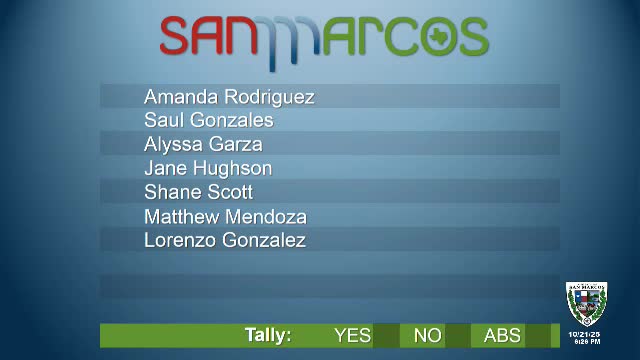San Marcos council approves ordinance codifying tenants' right to organize after debate over property-manager liability and door-to-door access
Get AI-powered insights, summaries, and transcripts
Subscribe
Summary
The San Marcos City Council voted 7-0 Oct. 21 to adopt an ordinance adding a tenants' right to organize to city code. Public commenters and council members debated whether property managers should be included as liable parties and whether tenant organizers may solicit on private property without an invitation.
The San Marcos City Council on Oct. 21 approved Ordinance 2025-43, amending Chapter 46 of the city code to add a tenants' right to organize and penalties for violations. The measure passed on the second of two readings by a 7-0 vote.
The ordinance formalizes a tenants' right to organize and includes provisions covering communications between landlords, their agents and tenants. Proponents during public comment said the measure will help tenants know and exercise organizing rights; opponents raised legal and operational concerns about including property managers as liable parties.
Hannah Garcia, speaking on behalf of the Austin Apartment Association, told council that including individual property managers as liable parties raises both legal and operational issues. Garcia cited state law in arguing that holding on-site employees personally liable could conflict with Texas statutes, saying, "Texas local government code section 250.003 specifically states an individual who's an employee of the owner of real property...is not personally liable for criminal or civil penalties," and that "Texas Property Code Chapter 92 specifically provides that the landlord is the only party liable for violations." Garcia urged council to review criminal-liability language for individuals.
Supporters said the ordinance must reach property managers to be effective. Maxfield Baker, a former council member who has advocated for renters' rights, said removing property managers from the ordinance would leave the measure "with no teeth" and would not protect the majority of local renters who interact primarily with on-site staff. Jared Chumsay, a volunteer with the Tenants Advocacy Group (TAG), said the ordinance would "open up our organizing efforts and shield us from retaliation from landlords as well as from property managers." Casey Baker, a resident commenter, said codifying the right publicly is important because many tenants do not know the protections they already have.
During council discussion, Councilmember Lorenzo Gonzales (identified in the meeting transcript as "Mister Lorenzo Gonzales") asked staff to clarify whether tenant organizers may enter private property without an invitation. Staff replied that the ordinance requires an organizer to be "invited by somebody that lives there" and to be accompanied by a tenant when on private property. Gonzales moved to amend the ordinance to remove the invitation requirement so that organizers could solicit at troubled properties; a second was made for discussion, but the council ultimately withdrew the proposed amendment before a vote.
Several council members cautioned against last-minute changes, citing Texas preemption and the risk of legal challenges. Councilmember Rodriguez (identified in the transcript as "Miss Rodriguez") noted that language in the Austin ordinance informed the city's approach and urged caution before adding new access rights without legal review. Councilmembers also discussed alternative outreach, including mailers and education efforts, and staff said the city's Office of Community Support and Resource Navigation is developing an online resource hub that will include tenant rights information and a marketing plan to get information out to residents.
The motion to adopt Ordinance 2025-43 was made by Councilmember Scott and seconded by Councilmember Rodriguez. The council voted 7-0 to approve the ordinance on second reading.
The adopted ordinance will appear in the city code as a new Article 4 in Chapter 46; the text as introduced includes specific rights and prohibitions and sets penalties for violations. The council and staff emphasized that the language was crafted to survive existing state preemption case law and that outreach and education remain priorities as the city implements the new code provisions.
